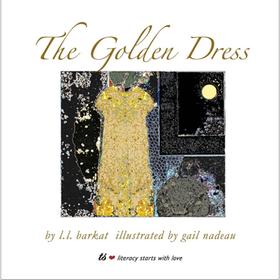L.L. Barkat is the founder and managing editor of Tweetspeak Poetry. She has contributed articles on books, parenting and education to the Huffington Post, is a freelance writer for Edutopia and is the author of six books for adults, including Rumors of Water: Thoughts on Creativity & Writing. Her children's titles include A Is for Azure: The Alphabet in Colors and a learn-to-read series that features cute chickens. Barkat's poetry has appeared in VQR, The Best American Poetry and on NPR. Her new work for children, The Golden Dress (TS Poetry), is available May 15, 2018.
 On your nightstand now:
On your nightstand now:
Everything Neil Gaiman. (I'm late to the party. What began with The View from the Cheap Seats has led to a long string of titles. I'll let you know when I come to the end of them.)
Good Bones--poetry by Maggie Smith.
And, can we count titles that have been on my nightstand for a year? I tend to read in two distinct ways: book-in-a-day and book-in-an-endless-timeframe.
Two endless-timeframe books I love and am reading aloud to my adult daughters when the mood hits: Eric Weiner's The Geography of Genius, which explores the question of how the most creative societies have become the most creative societies and Aja Raden's Stoned: Jewelry, Obsession, and How Desire Shapes the World, which I think might be self-explanatory.
Favorite book when you were a child:
When I was quite young, Ant and Bee. How intrepid they were! And how I wished I could be on the ship with them--the ship that floated on a line-art sea.
After that, the Chronicles of Narnia. They were the first books I stayed up far too late to read.
Your top five authors:
So many angles from which to answer this. I'll choose authors who make me want to be a better writer:
- Rebecca Solnit for her way of organizing disparate material and making something fascinating of it.
- Laurie Klein, poet, for her absolute way with words.
- Neil Gaiman for his endless willingness to turn an idea on its head.
- Bill Bryson for his comic vision, even if it's just about a walk in the woods.
- Aja Raden for her ability to turn history and economics into stories that rival a Harlequin romance (but with better vocabulary and fewer bedroom scenes).
Book you've faked reading:
Hmmm. I don't believe I've ever faked reading a book. I know what I like, and I don't apologize for what I don't like. So, yes, I willingly told the world I could not slog through Moby-Dick, War and Peace and Tess of the d'Urbervilles.
Book you're an evangelist for:
Spark: The Revolutionary New Science of Exercise and the Brain. I wish every school leader, teacher, parent and geriatric caregiver would read this book by John J. Ratey.
Book you've bought for the cover:
The Tin Forest by Helen Ward. It's a children's book about a visionary old man who lives near "a wide, windswept place, near nowhere and close to forgotten."
Book you hid from your parents:
Didn't hide anything that I recall. But? I read some of my mother's hidden books. One was Wuthering Heights. I couldn't figure out why it was hidden, then or now. Gothic passion?
Book that changed your life:
Jim Merkel's Radical Simplicity. Just the end bit, actually. He recommended a yearlong, daily foray to the same outdoor place. I took him up on the challenge and sat outside on a children's plastic, red sled for at least 15 minutes every day for the next 12 months. My daughter, who is now 20, recently told me, "Something happened that year. I didn't know what. But I knew you'd figured something out."
Favorite line from a book:
Thank you, Megan Willome, author of The Joy of Poetry. I will always quote you on this: "Poetry is my prescription for adversity."
Five books you'll never part with:
- The Artist's Way. I return to Julia Cameron's liberating work every spring, just when the earth is embarking on its own liberation project.
- The Essential Neruda. Editor Mark Eisner certainly named this one well.
- Adrienne Rich teaches us how to live in The Dream of a Common Language.
- I always love to return to Anna Akhmatova's work.
- There's something both heartbreaking and heart building about Mahmoud Darwish's The Butterfly's Burden, where you can find many deeply human lines. such as these from "We Were Missing a Present":
...Let's go as we are,
a free woman
and an old friend
let's go on two separate paths
let's go together,
and let's be kind...
Book you most want to read again for the first time:
Sigrid Undset taught me the singular power of the simple image, in her epic tale Kristin Lavransdatter, which follows one woman from childhood to death during medieval times in Norway. That's an experience worth repeating, if it were possible.

